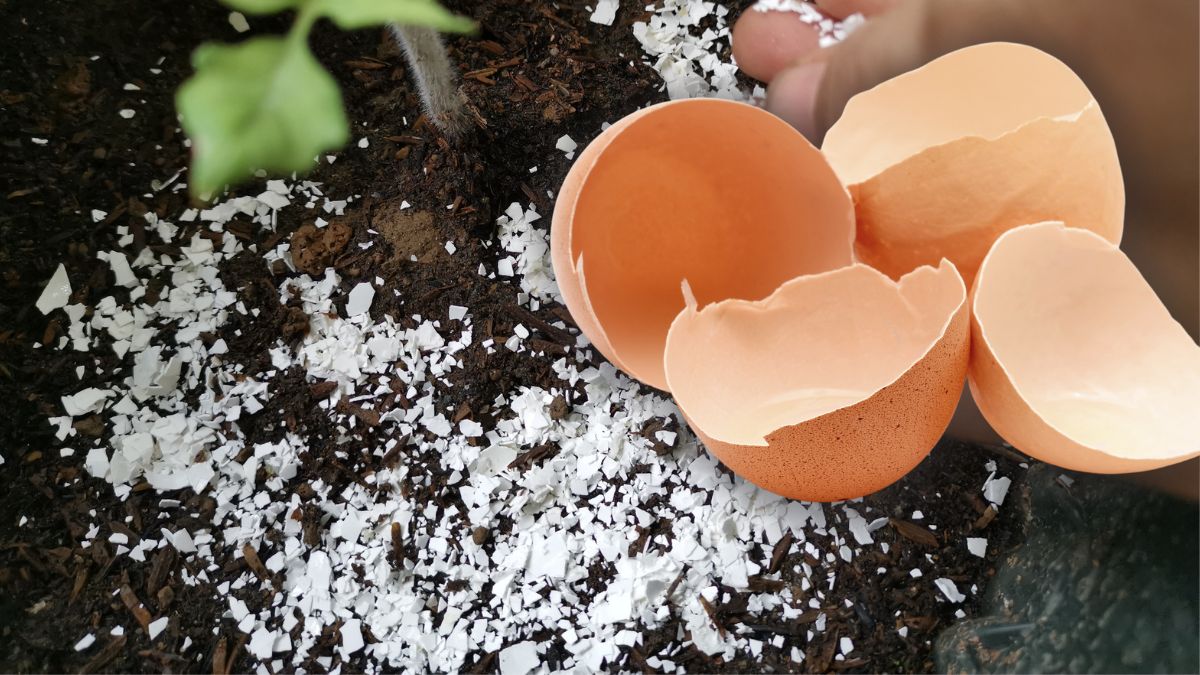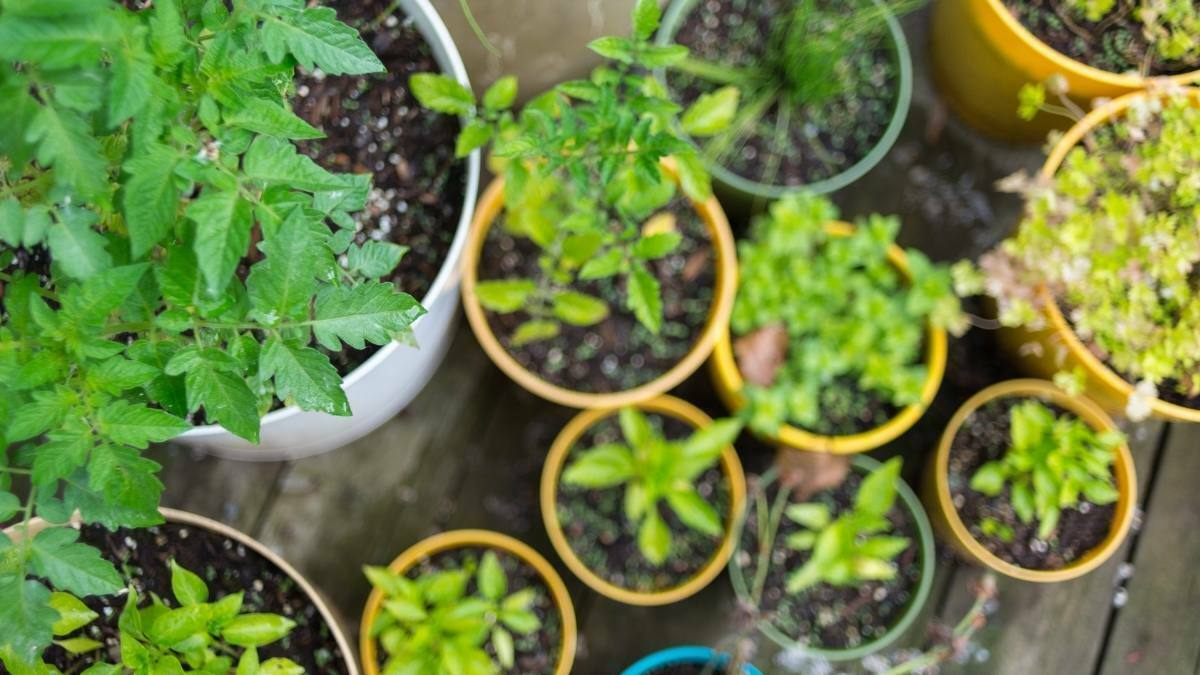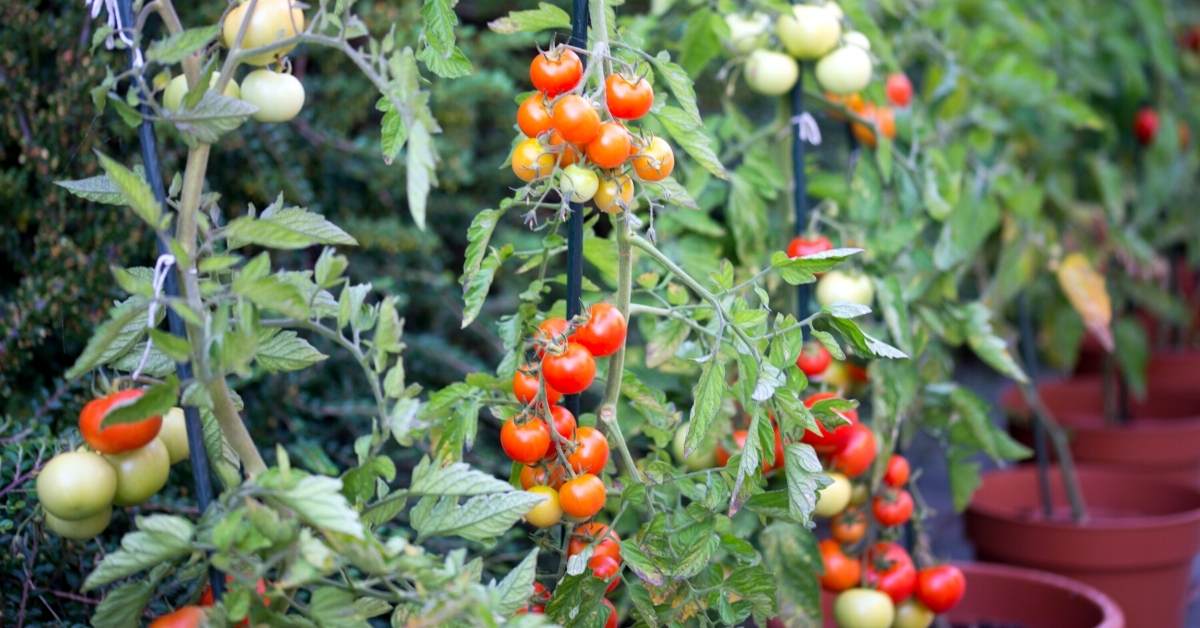If you are a gardener, you know how important it is to provide your plants with the best possible conditions for them to thrive. You may have tried different types of fertilizers, composts, and amendments to enrich your soil and boost your plant growth. But did you know that there are two simple and inexpensive materials that you probably have in your kitchen right now that can do wonders for your plants? I’m talking about eggshells and coffee grounds.
Eggshells and coffee grounds are not only good for your breakfast but also for your garden. They are rich in nutrients that plants need, such as calcium, nitrogen, phosphorus, magnesium, and potassium. They also help to improve the drainage and aeration of the soil, which allows water and air to reach the roots of plants more easily. And they can even help to suppress weeds by releasing caffeine into the soil.
Additional benefits of using eggshells and coffee grounds in your garden:
- They can help to prevent blossom end rot in tomatoes.
- They can help to attract beneficial insects to your garden.
- They can help to improve the flavor of your fruits and vegetables.
In this article, I will show you how to use eggshells and coffee grounds to boost your plant growth naturally and sustainably. You will learn how to prepare these materials, how to apply them to your soil or plants, and what benefits you can expect from them. By using eggshells and coffee grounds in your garden, you will not only save money and reduce waste but also create a healthier and more beautiful environment for yourself and your plants.
So grab a cup of coffee and some eggs, and let’s get started!
Scientific Facts About Eggshells and Coffee Grounds
You may be wondering why eggshells and coffee grounds are so good for your plants. Well, the answer lies in the science behind these two materials. Let’s take a look at some of the facts that explain how eggshells and coffee grounds can boost your plant growth.
Eggshells
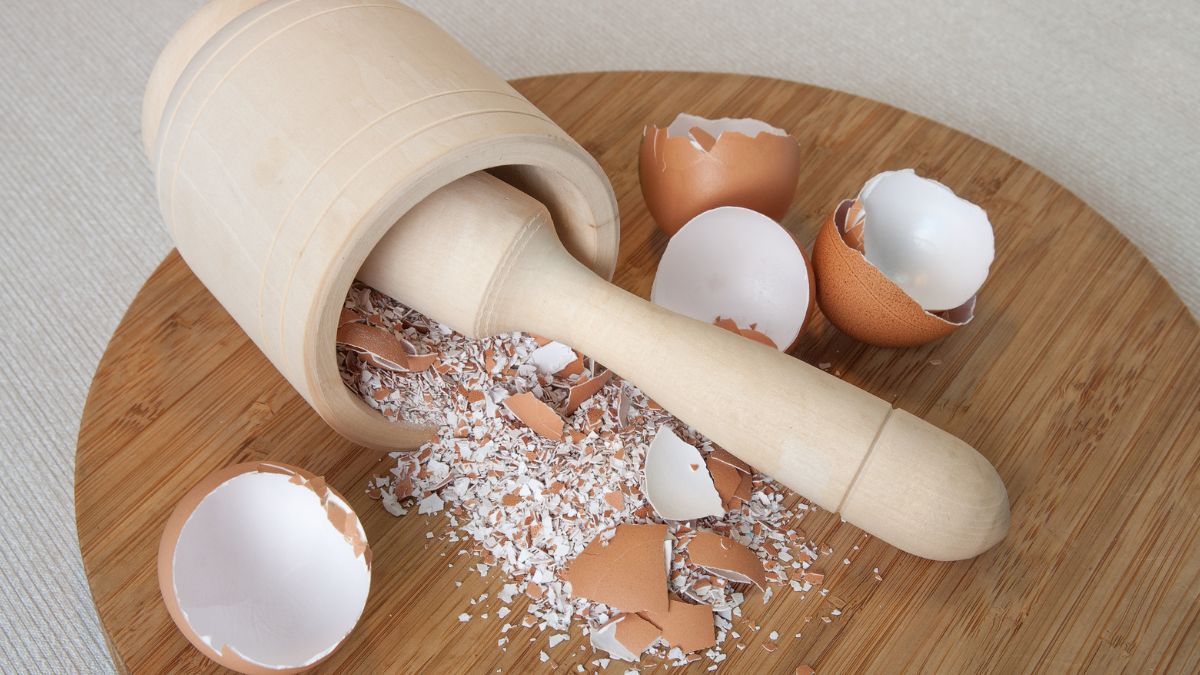
Eggshells are a good source of calcium, which is an essential nutrient for plant growth. Calcium helps plants to build strong cell walls and membranes, which protect them from diseases and pests. Calcium also helps plants to regulate water uptake and transport, which prevents wilting and drought stress. Calcium deficiency can cause problems such as blossom end rot, which is a common disorder in tomatoes, peppers, and zucchini.
Coffee Grounds
Coffee grounds are a good source of nitrogen, which is also an essential nutrient for plant growth. Nitrogen helps plants produce chlorophyll, which is the green pigment that allows them to capture sunlight and make food. Nitrogen also helps plants to grow faster and produce more leaves, flowers, and fruits. Nitrogen deficiency can cause problems such as yellowing and stunted growth.
Both eggshells and coffee grounds contain other nutrients that are beneficial for plants, such as phosphorus, magnesium, and potassium. Phosphorus helps plants to develop strong roots and flowers, magnesium helps plants to synthesize sugars and proteins, and potassium helps plants to regulate water balance and resist diseases.
The porous nature of eggshells and coffee grounds helps to improve the drainage and aeration of the soil, which allows water and air to reach the roots of plants more easily. This improves the soil structure and prevents compaction, which can hinder plant growth. The improved drainage also reduces the risk of root rot, which is a fungal disease that can kill plants.
The caffeine in coffee grounds can help to suppress weeds by inhibiting their germination and growth. This reduces the competition for nutrients, water, and space between your plants and unwanted plants. The caffeine can also deter some pests, such as slugs and snails, by acting as a natural repellent.
As you can see, eggshells and coffee grounds have many benefits for your plants. They provide them with essential nutrients, improve their soil conditions, and protect them from weeds and pests. By using these two materials in your garden, you can enhance your plant growth naturally and sustainably.
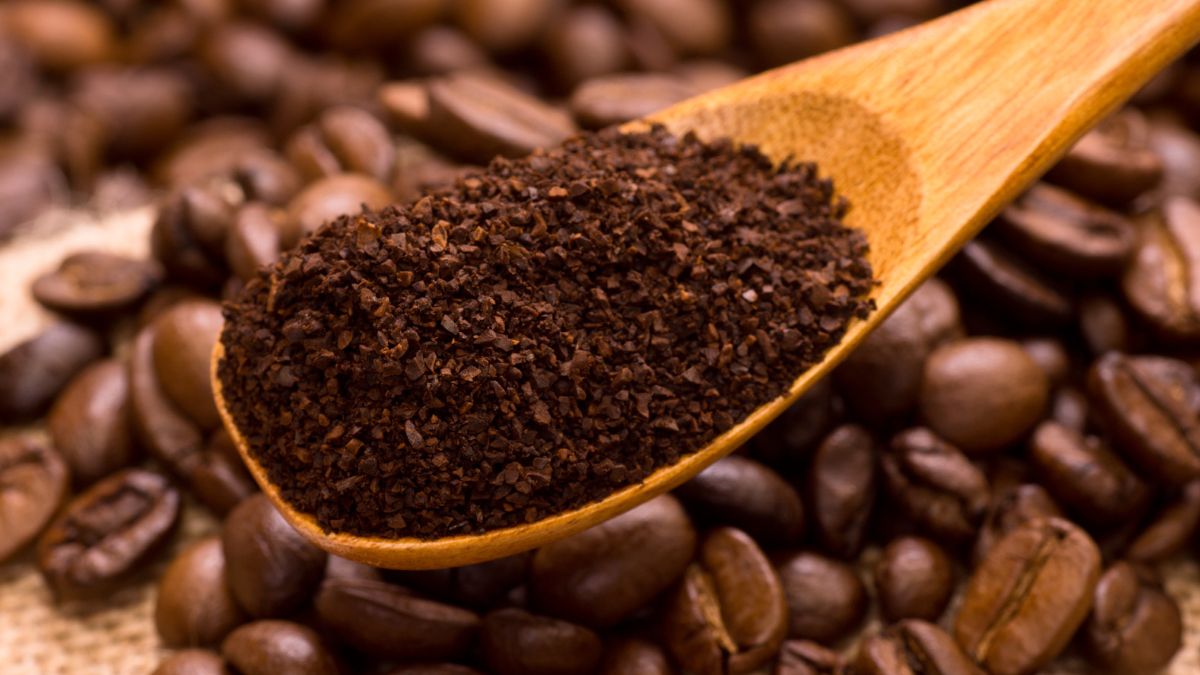
How to Use Eggshells and Coffee Grounds to Boost Plant Growth
Now that you know the scientific facts about eggshells and coffee grounds, you may be wondering how to use them in your garden. There are different ways to apply these materials to your soil or plants, depending on your preference and convenience. Here are some of the most common methods:
Crush the eggshells and coffee grounds before using them.
This will help them to decompose faster and release their nutrients more easily. You can use a blender, a food processor, a mortar and pestle, or a rolling pin to crush them. You can also dry them in the oven or microwave before crushing them, which will make them easier to handle and store.
Add crushed eggshells and coffee grounds to the soil when you are planting your seeds or seedlings.
This will provide them with a boost of nutrients from the start and help them to establish strong roots. You can mix the crushed eggshells and coffee grounds with the soil in the planting hole or sprinkle them on top of the soil around the plant. You can use about a tablespoon of each material per plant or per square foot of soil.
Use crushed eggshells and coffee grounds as mulch around your plants.
This will help to retain moisture, regulate temperature, prevent erosion, and suppress weeds. You can spread the crushed eggshells and coffee grounds around the base of your plants, leaving a few inches of space between the mulch and the stem. You can use about two tablespoons of each material per plant or per square foot of soil.
- To use eggshells and coffee grounds to boost plant growth, you can crush them and add them to the soil when you are planting your seeds or seedlings. You can also use them as mulch around your plants. You can also make a liquid fertilizer by blending eggshells and coffee grounds with water.
- When crushing eggshells, it is important to do so carefully so that you do not create a fine powder. The fine eggshell powder can be harmful to plants if it is inhaled.
- When using eggshells and coffee grounds as mulch, it is important to spread them evenly around your plants. You should also avoid piling the mulch too high, as this can suffocate the roots of your plants.
- When making a liquid fertilizer, you should blend the eggshells and coffee grounds with water until they are a fine paste. Then, you can dilute the paste with water and water your plants with it.
These are some of the ways you can use eggshells and coffee grounds to boost your plant growth. You can experiment with different methods and amounts to see what works best for your plants. Remember to always wash your eggshells and coffee grounds before using them, and avoid using salted or flavored coffee grounds, as they may harm your plants.
Additional Application Method
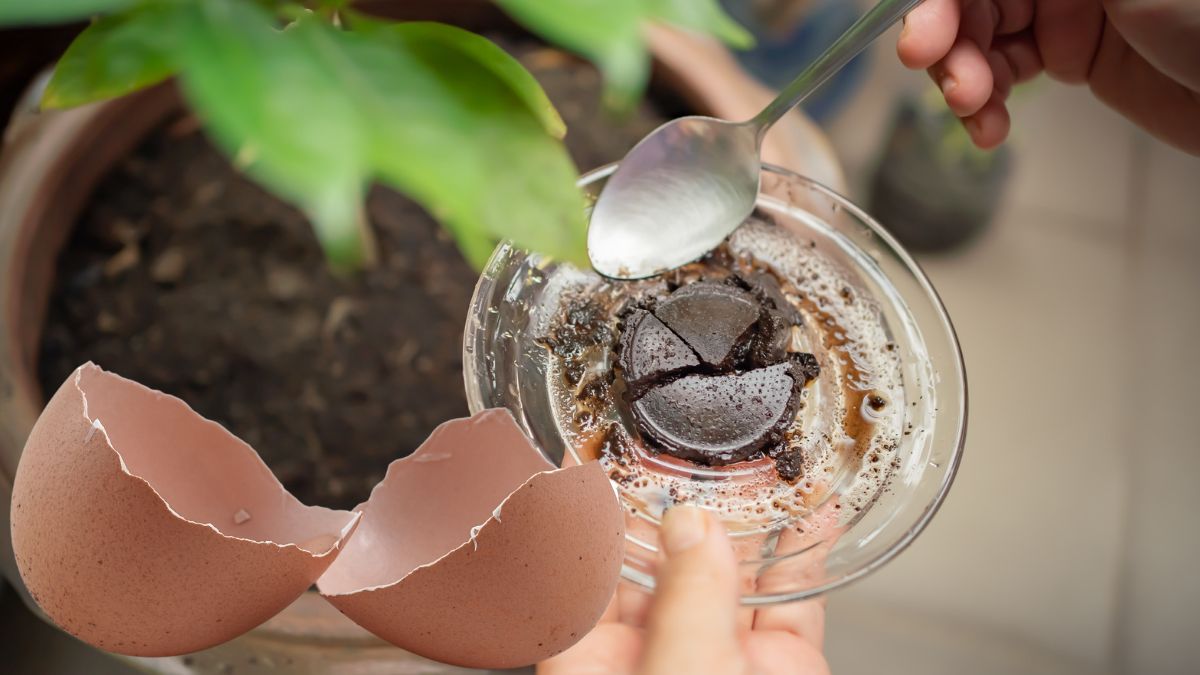
Some people prefer to use a blender to mix eggshells and coffee grounds with water and create a liquid fertilizer. This fertilizer can be watered on the soil around plants or used as a foliar spray. The liquid fertilizer is a good way to get nutrients from eggshells and coffee grounds to the roots of plants quickly. To make the liquid fertilizer, you will need the following:
- 4 cups of water
- 1 cup of crushed eggshells
- 1 cup of used coffee grounds
- Rinse the eggshells and coffee grounds well.
- Place the eggshells and coffee grounds in a blender.
- Blend all the ingredients together until smooth.
- Strain the mixture through a cheesecloth or a fine sieve to remove any solids.
- Store the liquid fertilizer in an airtight container in a cool and dark place.
- Use the liquid fertilizer once every two weeks during the growing season.
Dilute the liquid fertilizer with water before applying it to your plants. Use one part liquid fertilizer to four parts water for watering the soil, or one part liquid fertilizer to eight parts water for spraying the leaves.
This is another way you can use eggshells and coffee grounds to boost your plant growth. You can experiment with different ratios and amounts to see what works best for your plants. Remember to always wash your eggshells and coffee grounds before using them, and avoid using salted or flavored coffee grounds, as they may harm your plants.
The natural liquid fertilizer can be stored in the refrigerator for up to 2 weeks.
How Often and When to Apply the Liquid Fertilizer
If you decide to make your own liquid fertilizer from eggshells and coffee grounds, you may be wondering how often and when to apply it to your plants. The frequency and timing of your application will depend on the type of plants you have, the season, and the weather conditions. However, as a general rule, you should follow these guidelines:
Apply the liquid fertilizer every 2–4 weeks during the growing season. This will ensure that your plants get a steady supply of nutrients throughout their active growth period. You can adjust the frequency depending on how fast your plants are growing and how much they need feeding. For example, you may need to fertilize more often if your plants are producing a lot of flowers or fruits or if they are showing signs of nutrient deficiency, such as yellowing or stunted growth.
Apply the liquid fertilizer in the early morning or late evening before the hot midday sun. This will prevent the fertilizer from evaporating or burning your plants’ leaves. The cooler temperatures and higher humidity at these times will also help the fertilizer to penetrate deeper into the soil and reach the roots more effectively.
Avoid applying the liquid fertilizer when it’s raining or windy. This will prevent the fertilizer from being washed away or blown off by the elements. You want to make sure that the fertilizer stays on your soil or plants for as long as possible so that they can absorb it fully.
By following these tips, you can make the most of your homemade liquid fertilizer and give your plants a natural and sustainable boost of growth.
Conclusion
Eggshells and coffee grounds are two common household items that can be used to boost plant growth. They are a good source of nutrients for plants, and they can help to improve drainage and aeration of the soil. Using eggshells and coffee grounds to boost plant growth is a great way to reduce waste and save money. It is also a natural and sustainable way to improve the health of your plants.
In this article, you have learned how to use eggshells and coffee grounds to boost your plant growth naturally and sustainably. You have discovered the scientific facts behind these two materials and how they provide your plants with essential nutrients, improve your soil conditions, and protect your plants from weeds and pests.
You have also learned how to prepare and apply these materials to your soil or plants using different methods, such as crushing them, mixing them with water, or making a liquid fertilizer. And you have learned how often and when to apply the liquid fertilizer for optimal results.
By using eggshells and coffee grounds in your garden, you are not only saving money and reducing waste but also creating a healthier and more beautiful environment for yourself and your plants. You are also contributing to a greener and more sustainable future for our planet.
So what are you waiting for? Grab a cup of coffee and some eggs, and start using eggshells and coffee grounds in your garden today! You will be amazed by the difference they can make for your plant growth!
FAQ
What are some of the drawbacks or risks of using eggshells and coffee grounds in the garden?
Eggshells and coffee grounds are generally safe and beneficial for the garden, but they may also have some drawbacks or risks if used excessively or improperly. Some of the possible drawbacks or risks are:
Eggshells and coffee grounds may attract unwanted animals or insects to your garden, such as rodents, raccoons, slugs, snails, ants, or flies. These pests may feed on organic materials or damage your plants. To prevent this, you should crush the eggshells and coffee grounds finely before using them and avoid leaving large pieces or piles on the soil surface. You can also cover them with a thin layer of soil or compost to mask their smell and appearance.
Eggshells and coffee grounds may alter the pH level of your soil, making it more acidic or alkaline. This may affect the availability of nutrients and the growth of some plants. To avoid this, you should test your soil pH before and after using eggshells and coffee grounds and adjust it accordingly if needed. You can use a pH meter or a pH test kit to measure your soil pH. You can also use lime or wood ash to raise your soil pH if it becomes too acidic or sulfur or peat moss to lower your soil pH if it becomes too alkaline.
Eggshells and coffee grounds may contain harmful bacteria or pathogens that can cause diseases in plants or humans. This may happen if the eggshells or coffee grounds are contaminated by animal feces, mold, or other sources of infection. To avoid this, you should wash and dry the eggshells and coffee grounds thoroughly before using them, and avoid using them on edible plants that are close to harvest. You can also sterilize them by boiling them in water for 10 minutes or baking them in an oven at 200°F for 20 minutes.
How to store eggshells and coffee grounds for later use in the garden?
Eggshells and coffee grounds can be stored for later use in the garden if you follow these steps:
Wash and dry the eggshells and coffee grounds thoroughly after using them. This will remove any dirt, oil, or residue that may cause them to spoil or smell bad.
Crush the eggshells and coffee grounds finely before storing them. This will help them to decompose faster and release their nutrients more easily when you use them later. You can use a blender, a food processor, a mortar and pestle, or a rolling pin to crush them. You can also dry them in the oven or microwave before crushing them, which will make them easier to handle and store.
Store the crushed eggshells and coffee grounds in an airtight container in a cool and dry place. This will prevent them from absorbing moisture, losing their potency, or attracting pests. You can use a glass jar, a plastic bag, a metal tin, or any other container that has a tight lid. You can also label the container with the date of collection and the amount of material inside.
Use the stored eggshells and coffee grounds within 6 months of collection. This will ensure that they still have their nutrients and benefits intact. You can check their quality by smelling them or looking at their color. If they smell bad or have changed color significantly, you should discard them.
What are some other organic materials that can be used in the garden besides eggshells and coffee grounds?
Many other organic materials can be used in the garden besides eggshells and coffee grounds. Some of the most common ones are:
Banana peels: They are rich in potassium, which is important for plant growth and fruit development. They also contain phosphorus, calcium, magnesium, sulfur, and trace elements. You can chop up banana peels and bury them in the soil around your plants or make a liquid fertilizer by soaking them in water for a few days.
Tea leaves: They are high in nitrogen, which is essential for plant growth and leaf production. They also contain tannic acid, which helps to lower the pH level of your soil and make it more acidic. You can sprinkle tea leaves on top of your soil as mulch or brew them into a tea and water your plants with it.
Grass clippings: They are abundant in nitrogen, which is vital for plant growth and leaf production. They also help to retain moisture, regulate temperature, prevent erosion, and suppress weeds. You can spread grass clippings around your plants as mulch or add them to your compost pile to speed up the decomposition process.
Vegetable scraps: They are loaded with various nutrients, such as nitrogen, phosphorus, potassium, calcium, magnesium, and iron. They also help to improve the structure and fertility of your soil. You can chop up vegetable scraps and bury them in your soil as green manure or compost them into organic fertilizer.
